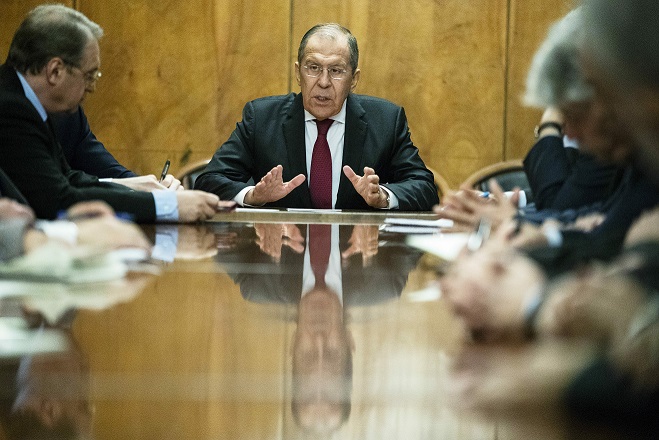03/05/2019 . 3:35:26 PM . UPDATED ON 03/05/2019 . 3:35:32 PM
Russia’s Foreign Minister Sergei Lavrov said on Monday that a proposal to host the Israeli Prime Minister Benjamin Netanyahu and Palestinian President Mahmoud Abbas in Moscow was reaffirmed during Netanyahu’s visit to Kreml last week.
“During Netanyahu’s visit to Moscow the situation in the Israeli-Palestinian settlement was discussed. We reaffirmed our position on Russia’s interest in overcoming the deadlock in this matter as soon as possible,” Lavrov said according to the official twitter account of Russia’s embassy in Israel.
Lavrov, who visited Saudi Arabia on Monday, said that Moscow is ready to resume a direct dialogue between Israel and the Palestinians “without preconditions”.
“We confirmed our readiness to receive the leaders of Israel and Palestine in Russia so that they resume direct dialogue without any preconditions. In due time our Israeli colleagues, including Netanyahu asked us about it. Abbas agreed with this,” he added.
“Our proposal to host leaders of Israel and Palestine remains relevant. We believe that it would be at least a very important step in restoring confidence. Without this, it is impossible to count on further progress in the Israeli-Palestinian settlement,” Lavrov concluded.
Earlier this month, Lavrov told Palestinian factions in Moscow that the long awaited United States Middle East peace plan will “destroy everything” that has been done so far.
“American colleagues propose, rather than come up with new ideas to solve the problem. (They) have been promising for more than two years to propose some “deal of the century.” But it’s clear that the information available enables us to assess this “deal of the century,” as one that would destroy everything that has been done so far,” Lavrov said.
Russia has taken a critical stance toward the US peace plan from the beginning, emphasizing two states as a requirement of any proposal to the conflict.
However, Moscow and Washington seem to agree when it comes to unifying the Palestinians.
US President Donald Trump’s son-in-law and adviser Jared Kushner said last week that Washington wants to see the Palestinians “united under one leadership. The Palestinians want a non-corrupt government that cares for their own interests.”
In his meeting with Palestinian factions in Moscow earlier this month, Lavrov expressed a similar view:
“This, probably difficult decision, (to unite) is unique in that it depends on you only. It doesn’t depend on no external actors. External actors who might have varying agendas will try to break you up, (and send you) to different corners of one or another room and to prevent the fateful decision (to unite), which, I believe, you must make,” he said.
“Ending the split will strengthen the position of Russia and the international community, supporting a diplomatic solution based on decisions of the international community. There are countries that don’t see an end to the division and therefore conclude that without it, the two-state solution has become mission impossible,” the Russian Foreign Minister concluded.
